Taliban spokesman Suhail Shaheen confirmed on Thursday that the head of the Taliban’s political office in Qatar met with the executive director of the United Nations World Food Programme (WFP), David Beasley, on Thursday.
The WFP is a U.N. agency that focuses on distributing food aid to vulnerable communities around the world. It won the 2020 Nobel Peace Prize for its efforts.
Beasley’s meeting follows over a week of indications from the WFP, including from Beasley himself, that the U.N. agency is open to cooperating with the Taliban. An article on the organization’s website expressed hope following the fall of the former Afghan government in Kabul that Taliban leaders would enact a “peaceful transition” out of the corrupt Islamist former Afghan government to a radical jihadist terrorist regime. The Taliban completed its ouster of the Afghan government on August 15.
Other U.N. organizations – including the Security Council, UNICEF, and the Human Rights Council – have failed to condemn Taliban human rights abuses and instead expressed interest and, in some cases, hope in collaborating with the brutal Taliban organization.
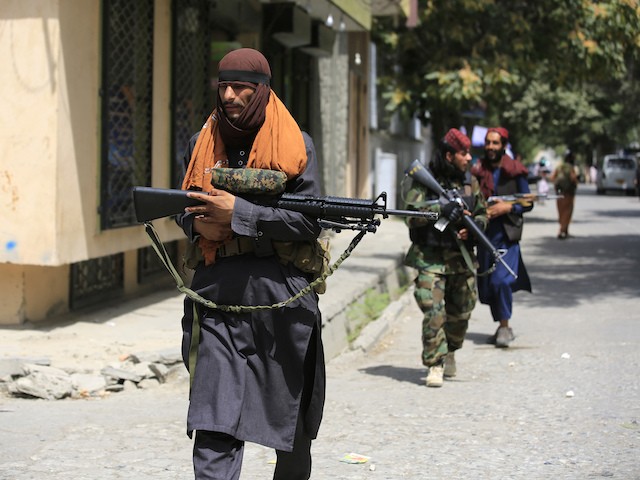
Taliban fighters patrol in Wazir Akbar Khan in the city of Kabul, Afghanistan, August 18, 2021. (AP Photo/Rahmat Gul)
The Taliban ruled Afghanistan from 1996 to 2001, when the U.S. military invaded the country in response to the September 11 jihadist terror attacks on American soil. Its reign was defined by extreme brutality, most prominently the rampant murder and torture of civilians and extreme subjugation of women as part of the group’s violent interpretation of sharia, or Islamic law. Taliban spokesmen have insisted the group will rule in a more “inclusive” manner this time, but widespread evidence has surfaced in the past month of jihadists abusing women, publicly beating and executing civilians, and threatening U.N. workers in particularly.
Shaheen confirmed the meeting between Beasley, the WFP head, and senior Taliban leader Sher Mohammad Abbas Stanikzai on Thursday.
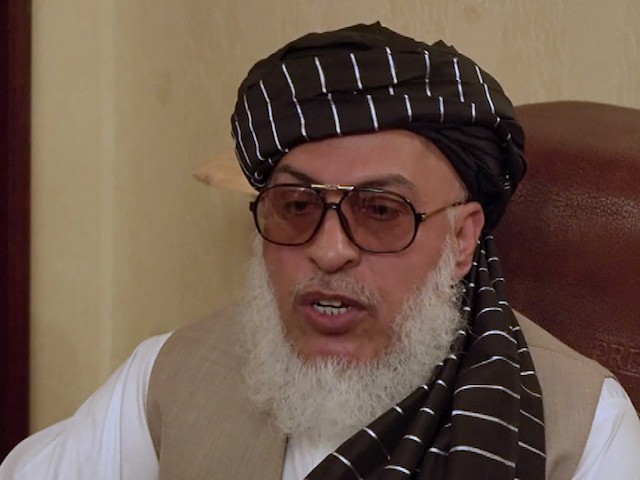
This AFPTV screengrab from a video made on May 28, 2019, in Moscow shows Afghan Taliban Stanikzai Sher Mohammad Abbas on the sidelines of a conference marking a century of diplomatic relations between Afghanistan and Russia, followed by discussions with Afghan politicians about the future of the country. (Nikolay Korzhov/AFP via Getty Images)
“They discussed humanitarian issues and ongoing situation [sic] of Afghanistan including problems emerged [sic] as a result of drought and pandemic,” Shaheen claimed. If true, Beasley will have been the first to address the ongoing Chinese coronavirus pandemic with the Taliban, which has offered no public plan for handling what has become an increasingly pressing emergency in Afghanistan.
Shaheen concluded that the Taliban’s representatives “assured the executive director of WFP of its cooperation and security and appreciated their humanitarian assistance.”
The WFP itself has not, at press time, confirmed the meeting.
Beasley’s last major public statement appeared on the WFP’s Twitter account on Wednesday. Beasley himself filmed a video from Islamabad, Pakistan’s international airport, thanking the government of Pakistan for supporting the organization.
“The Pakistan government has really helped us so that we could bring the aircraft that were damaged in Kabul here to get them repaired so we can put them back in service,” Beasley said. He credited Pakistan’s help with making it possible to create an “air bridge” into Afghanistan to “bring un personnel, NGOs, aid workers, to be able to do what we need to do inside Afghanistan.”
The Islamist government of Pakistani Prime Minister Imran Khan celebrated the fall of the government in Kabul and has expressed support for the Taliban. Khan himself congratulated the Taliban for its violent conquest of the nation, stating that the jihadists had “broken the shackles of slavery” from the United States and free Western societies.
Reports on Friday revealed that Pakistani authorities had opened fire on throngs of desperate Afghan refugees on the nation’s border, attempting to escape Taliban rule. Taliban leaders have explicitly requested Afghans not leave the country and banned Afghan nationals from entry into Kabul’s Hamid Karzai International Airport.
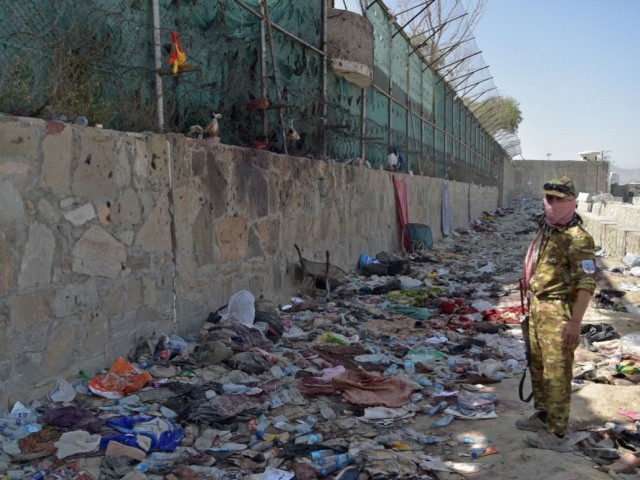
A Taliban fighter stands guard at the site of the August 26 twin suicide bombs, which killed scores of people including 13 US troops, at Kabul airport on August 27, 2021. (Wakil Kohsar/AFP via Getty Images)
Prior to the reported meeting on Thursday, Beasley had told the Qatari network al-Jazeera that the Taliban had also helped the WFP with humanitarian aid.
“Whether it’s the Taliban or others, we are receiving the cooperation we need,” Beasley asserted. “We’ve told everyone on the ground that we need neutrality, impartiality, independence. So far everyone has given us what we need to reach the people.”
“So far they [the Taliban] have calibrated, cooperated and given us the access we need,” Beasley said. “I hope it continues … and I expect it to continue,” he said.
WFP calls for emergency assistance to Afghanistan have abstained from mentioning the Taliban at all, much less its role in the current chaos in the country. The agency instead has focused on the fact that Afghans will soon face the nation’s severe winters and the agency needs to stock up while land transport is still possible safely.
“Usually at this time of year, WFP is busy pre-positioning food stocks in warehouses and with communities across Afghanistan, to be then distributed to needy Afghan families before they are cut off by brutal winter snows,” WFP’s regional deputy director for Asia and the Pacific Anthea Webb said at a briefing this week. She blamed “tight funding levels,” not the emergence of a terrorist organization as the de facto government of the country, for any potential setbacks in distribution.
The Taliban have engaged in significant violence in Kabul since its ascent to power on August 15. Locals in Kabul told international news outlets that Taliban thugs almost immediately began to engage in door-to-door raids seeking anyone who may have worked with the American government in the last 20 years, as well as journalists and religious minorities, among other vulnerable populations. The U.S. government confirmed the beating of several American citizens at the hands of the Taliban.
The United Nations has completely abstained from condemning Taliban violence. In the immediate aftermath of the Taliban’s takeover, the Security Council issued a statement echoing Taliban spokesmen’s calls for an “inclusive” Taliban regime.
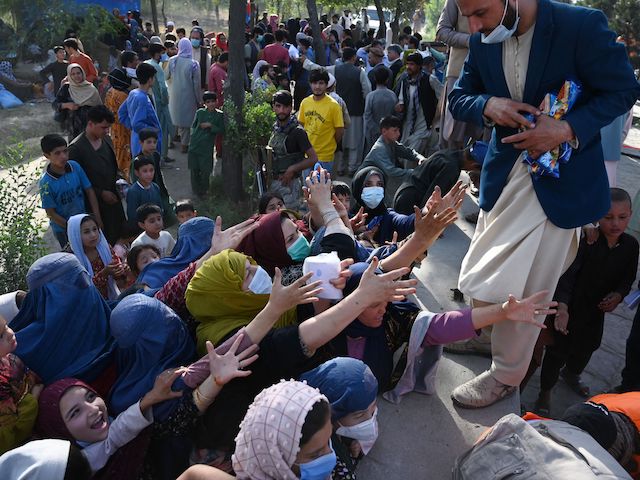
Internally displaced Afghan families, who fled from Kunduz and Takhar province due to battles between Taliban and Afghan security forces, collect food in Kabul on August 9, 2021. (Wakil Kohsar KOHSAR/AFP via Getty Images)
“The members of the Security Council called for an immediate cessation of all hostilities and the establishment, through inclusive negotiations, of a new government that is united, inclusive and representative,” the statement read, without mentioning the Taliban, “including with the full, equal and meaningful participation of women.”
The Human Rights Council held a meeting to discuss passing a resolution on Afghanistan this week, but did not vote on the draft circulated, reportedly written by representatives from Pakistan. The draft resolution also failed to mention the Taliban at all and only expressed “deep concern” for the erupting human rights crisis there, expressing “unwavering commitment to the rights of women and girls.”
The Taliban ordered all women and girls not to leave the house in Kabul until further notice this week. During its prior rule, it allowed women in public only with a male chaperone and wearing a burqa, a full-body covering that also hides the wearer’s eyes.
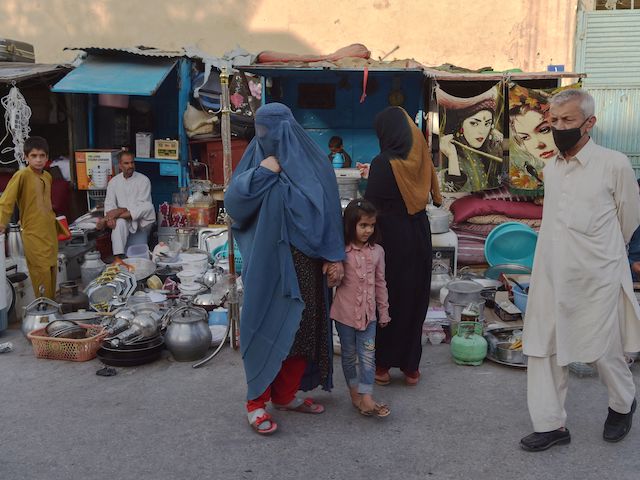
A burqa-clad Afghan woman looks for items to buy at a shop displaying used household items for sale at a market area in Kabul on August 25, 2021, which were earlier purchased from the people who faced financial adversities and those who fled the country after the Taliban’s military takeover of Afghanistan. (Wakil Kohsar/AFP via Getty Images)
The head of UNICEF, the U.N. children’s agency, in Afghanistan told reporters that he was “quite optimistic” about the Taliban’s attitude towards girls going to school shortly after the Taliban takeover. In its previous iteration, the Taliban forbade girls from all education. The UNICEF official, Afghanistan operations head Mustapha Ben Messaoud, said the agency had “not had a single issue with the Taliban” at the time.
Reuters claimed to obtain an internal United Nations document on Wednesday that revealed the global organization had extensive evidence of Taliban violence against U.N. workers in Kabul and throughout Afghanistan, including beatings and lootings of U.N. offices.
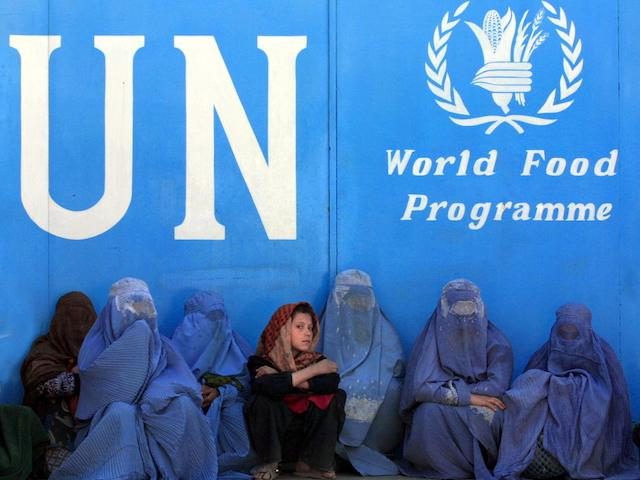
COMMENTS
Please let us know if you're having issues with commenting.